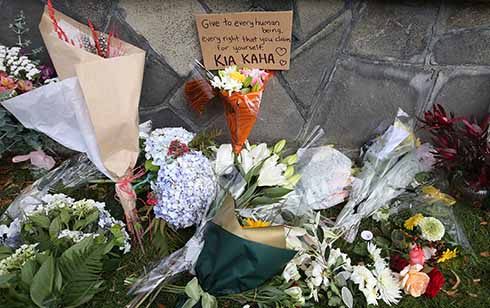
flowers at Christchurch Botanic Garden after shootings-getty
On Friday 15 March we became aware of the horrific terrorist attack in Christchurch. Since then we have sought to make sense of what has happened and how we might overcome the fear and anger these events have caused.
Personally, I have struggled with the murder of so many peaceful and faithful people who were killed not so far from us.
The Sunday of that weekend I attended the open day at the Geelong West Mosque with my family. My children noticed two police cars and asked me about them. I told them that the police always attend large gatherings. However, the next day the media reported that the police presence was in fact a direct response online threats towards the Muslim community of Geelong ‘inspired’ by the massacre in New Zealand.
CHALLENGE OF ‘WHAT IF’
My belief that we as a society would come together at this time and work to build bridges, and care for our local Islamic community, as thousands did on Sunday, now seems naive. My ability to judge situations and keep my family safe has also taken a blow. The question, ‘What if?’ is a challenging and dangerous thought at times like this.
In light of these events we need to stop for a moment and consider what can we learn from the situation. What good can come from all that has happened and the hate that festers in our society still?
A small number of media outlets in the United Kingdom and New Zealand reported a story about Mr Farid Ahmed, whose wife was murdered in front of him during Friday’s massacre. The words he offered speak of his enormous courage and faith. He said:
“I lost my wife but I do not hate the killer. As a person I love him. But I’m sorry I cannot support what he did, but I think somewhere along in his life maybe he was hurt but could not translate that hurt into a positive manner. That’s why he’s doing wrong.
People who carry out terrorist attacks, they want people to be afraid, they want to incite (sic) between one group and another. Maybe they were hoping that if they target some Muslims, then maybe Muslims will retaliate, but we Muslim leaders are saying, that’s not going to happen. We will not allow you to feel afraid or to hate other people because of some of your horrendous attacks.
I don’t have any grudge against him. I have forgiven him and I’m praying for him that God will guide him and then one day he will be a saviour.”
TIMELESS WISDOM
Farid’s wisdom is timeless and seemingly beyond what we as humans are capable of. Sadly, this story has not been printed via the Australian media at this time. Locally our media outlets are reporting the negative side of the story, including the headline news yesterday of the threats made to the Geelong community.
In attempting to bring these two opposing viewpoints together we may draw some profit. When we focus on the negative aspects of a situation or life generally we become insular and dispirited. When we focus on hope and positivity we become generous and merciful. Therefore in the world we live we must be critical in the ‘news’ we read and selective in the sources we allow to inform and guide us.
Considering Farid’s response to the loss of his wife and his extreme measure of forgiveness we can be inspired to find the good in such an awful event. We have the ability to choose how we are effected and how we respond. Farid’s response as a Muslim is the same response Jesus asks of us as Catholics.
‘LOVE YOUR NEIGHBOUR'
Jesus said we must ‘love your neighbour as your self’ (Matthew 22:36-40). That we should forgive well beyond what we feel we are able to or for the things we believe we should not forgive (Matthew 18: 21-22). As we journey through the second half of Lent maybe we can consider a different kind of fasting. In light of the events in Christchurch, guided by the teachings of Jesus and inspired by Farid maybe we could give up our lack of mercy and compassion during Lent.
As you continue to prepare for the coming of Jesus at Easter over the remaining weeks look for those moments where you might respond differently and be attentive to thoughts that do not match who you are called to be.
When you are insulted – accept the persecution graciously.
When you feel anger – offer mercy.
When you are tempted to view someone as ‘other’ – offer empathy.
When you want to reject someone – offer compassion.
When you have been hurt – forgive.
When you have been hurt – forgive.
When you have been hurt – forgive. Repeat this at least another 487 times (Matthew 18: 21-22).
PATH TO PEACE
This is what Jesus asks of us and this is the only path to peace. Peace in our world and peace for ourselves. This Lent fast in this way and watch the world change because of the grace and love you offer.
With all of these things in mind I am still challenged by the events in New Zealand and what I need to forgive. I am also comforted in these thoughts that as a parent my choice to offer friendship to a marginalised community have not altered because of anonymous online threats. We can all find good in every situation we encounter. As St Ignatius taught, ‘Find God in all things’. I hope you can find the good in this terrible event and bring good through your Lenten pilgrimage.
Brendan Nicholls is liturgy coordinator at St Ignatius College Geelong.
Image: People gather to lay flowers outside the Botanic Gardens, Christchurch, New Zealand. (Fiona Goodall/Getty Images)